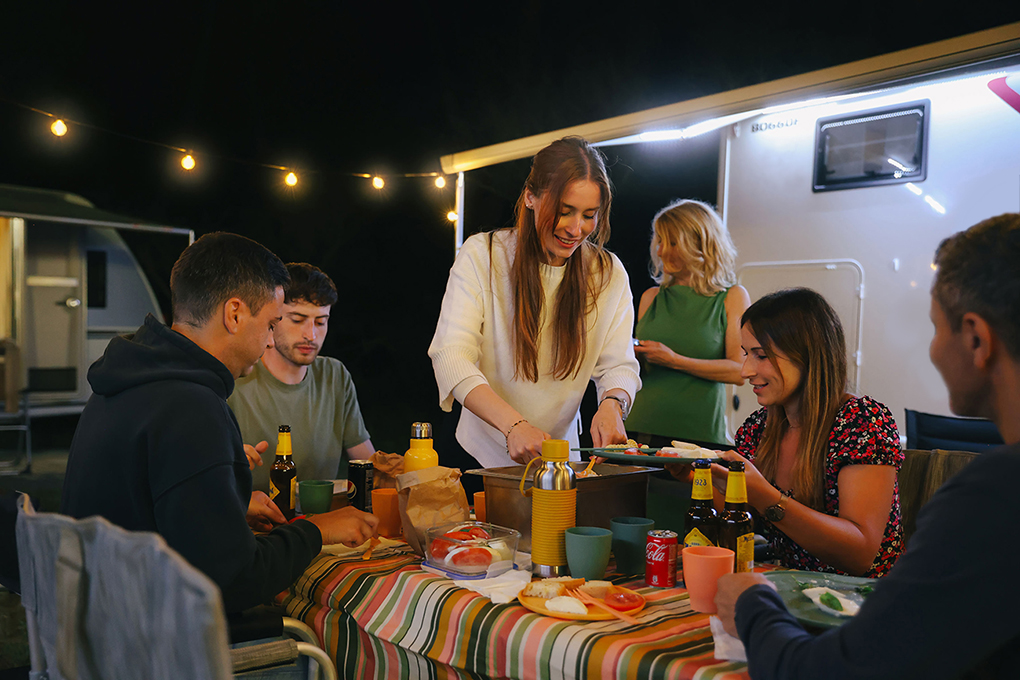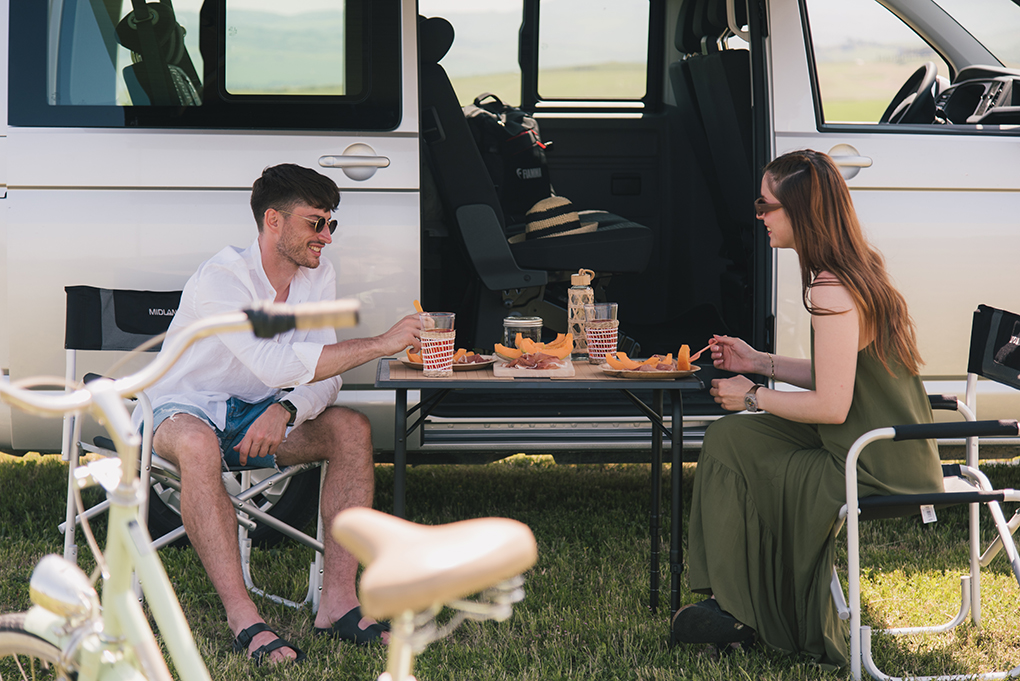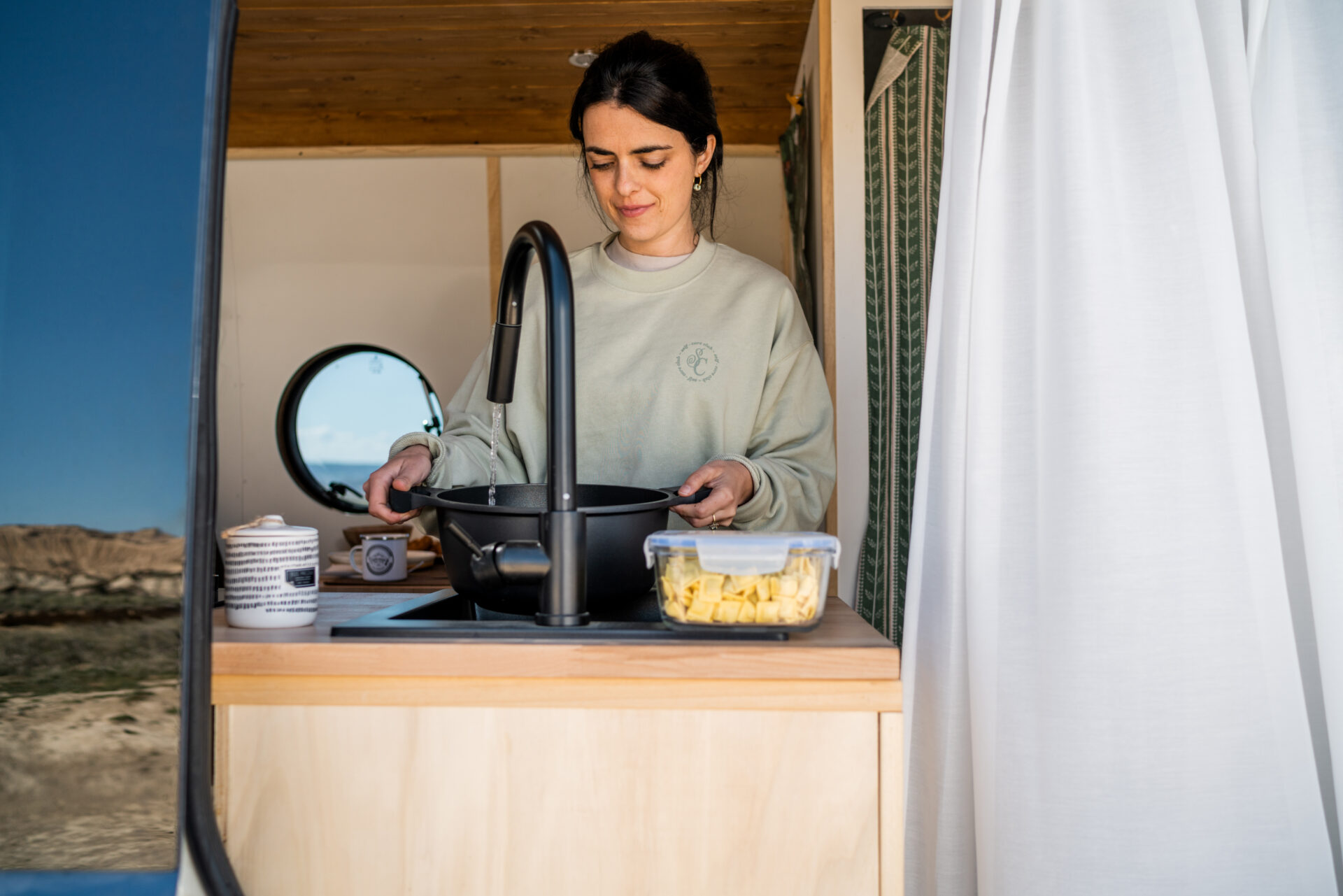Travelling in your own van, motorhome or caravan is a wonderful way to rediscover a deep sense of nature, reconnect with the environment and appreciate the beauty of life in the open air. This holiday philosophy, which for many is also a philosophy of life, also brings with it important choices regarding the impact on the environment (as we reported in a previous article). For example, when travelling we pay more attention to how much waste we produce, we try to adopt eco-friendly solutions in our choice of vehicle and appliances, we use bicycles as much as possible to get around, and much more. Why not take some extra precautions when it comes to cooking as well?
During an on-the-road holiday it is important to cook sustainably on a day-to-day basis. In this article, the Fiamma team has prepared some tips on how you can reduce your impact on the environment even when you are cooking, as well as three anti-waste and easy-to-prepare recipes.

Why is sustainable cooking important while on holiday in a van or motorhome?
Paying attention to the environment even when it comes time for lunch or dinner during an on-the-road holiday is crucial for many reasons.
Waste Reduction
During a van or campervan holiday, you are often far from conventional services and facilities such as markets and grocery shops, which means it is more difficult to find fresh food or dispose of waste. By cooking sustainably, you can reduce food waste, the use of packaging and the production of waste.
Less impact on the environment
Sustainable cooking can help reduce environmental impact. For example, by using energy-efficient appliances or renewable energy sources (such as solar panels installed on your vehicle), you can reduce energy consumption when preparing meals.
Saving Resources
Cooking sustainably can help preserve natural resources such as water and soil. For example, if you choose local and seasonal foods, you help reduce the need to transport food over long distances and thus minimize the large-scale use of fertilizers and pesticides.
Tips for sustainable cooking on the road
Cooking while reducing the impact on the environment is easier than it looks. Here are some ways to cook sustainably during a van or motorhome holiday.

Choose local and seasonal foods
Buy local and seasonal foods whenever possible. These products often have a smaller ecological footprint because they require less transport and fewer resources to grow. Not only that, they also taste much better!
Limit Packaging
Reduce the use of disposable packaging, such as plastic bags and single-use containers. Use reusable containers and shopping bags.
Minimize food waste
Plan meals so that ingredients are fully utilized and waste is reduced. Store leftovers properly for later consumption.
Use efficient appliances
If you have appliances such as a cooker or refrigerator in your van or motorhome, opt for energy-efficient appliances.
Preparing environmentally friendly recipes
During an outdoor holiday, it is important to prepare dishes that are easy to cook but also minimize food waste. Here are three ‘Made in Fiamma’ anti-waste recipes ideal for an outdoor adventure.
1 – Quinoa salad and grilled vegetables
Ingredients:
• Quinoa
• Seasonal vegetables
• Olive oil
• Salt and pepper
• Aromatic herbs
Preparation:
• Cook quinoa according to the instructions on the package.
• Cut vegetables into slices and grill them on a portable grill with a little olive oil, salt, pepper and herbs.
• Once cooked, mix the grilled vegetables with the cooked quinoa. Adjust the salt and pepper to your taste. You can add a little extra olive oil if necessary.
• Serve the salad warm
2 – Risotto with salvaged vegetables
Ingredients:
• Arborio or Carnaroli rice
• Recycled vegetables (e.g. leftover grilled vegetables, pieces of vegetables left over from other preparations)
• Vegetable stock (prepared in advance or using stock cubes)
• Onion
• Butter or olive oil
• Grated cheese (optional)
Preparation:
• In a saucepan, sauté the chopped onion in a little butter or olive oil until translucent.
• Add the rice and toast it for a few minutes.
• Gradually add the hot vegetable stock, stirring constantly, until the rice is cooked and creamy.
• Add the vegetables at the end of the cooking time and mix well.
• If desired, add grated cheese for extra creaminess.
• Serve the risotto hot.
3– Green Omelette
Ingredients:
• Eggs
• Leftover vegetables (e.g. pieces of courgettes, mushrooms, peppers, onion, etc.)
• Cheese to taste (optional)
• Salt and pepper
• Olive oil
Preparation:
• In a non-stick pan, heat a little olive oil.
• Add the leftover vegetables and sauté until well heated.
• Beat the eggs in a separate bowl with a pinch of salt and pepper.
• Pour the beaten eggs over the vegetables in the pan.
• Cook over medium-low heat until the eggs are well set and the underside is golden brown.
• If desired, add grated cheese on top of the omelette and let it melt.
• Serve the omelette cut into wedges.
These anti-waste recipes are very versatile and can be easily adapted using the ingredients you have on hand. Moreover, they can be prepared using only a frying pan or a saucepan.
Try them out and let us know how it went by tagging Fiamma on social media!

